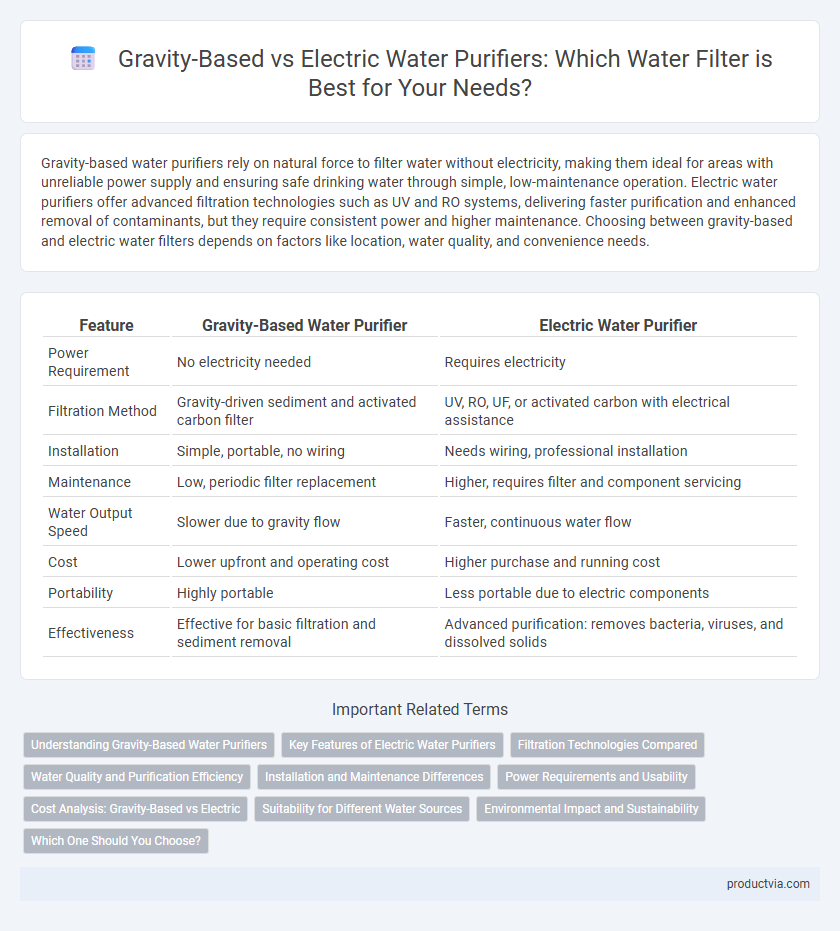Gravity-based water purifiers rely on natural force to filter water without electricity, making them ideal for areas with unreliable power supply and ensuring safe drinking water through simple, low-maintenance operation. Electric water purifiers offer advanced filtration technologies such as UV and RO systems, delivering faster purification and enhanced removal of contaminants, but they require consistent power and higher maintenance. Choosing between gravity-based and electric water filters depends on factors like location, water quality, and convenience needs.
Table of Comparison
| Feature | Gravity-Based Water Purifier | Electric Water Purifier |
|---|---|---|
| Power Requirement | No electricity needed | Requires electricity |
| Filtration Method | Gravity-driven sediment and activated carbon filter | UV, RO, UF, or activated carbon with electrical assistance |
| Installation | Simple, portable, no wiring | Needs wiring, professional installation |
| Maintenance | Low, periodic filter replacement | Higher, requires filter and component servicing |
| Water Output Speed | Slower due to gravity flow | Faster, continuous water flow |
| Cost | Lower upfront and operating cost | Higher purchase and running cost |
| Portability | Highly portable | Less portable due to electric components |
| Effectiveness | Effective for basic filtration and sediment removal | Advanced purification: removes bacteria, viruses, and dissolved solids |
Understanding Gravity-Based Water Purifiers
Gravity-based water purifiers rely on natural force to filter water without electricity, making them ideal for areas with limited power supply. These purifiers use activated carbon and ceramic filters to remove contaminants, pathogens, and sediments, ensuring safe drinking water. Their low maintenance, portability, and energy independence contribute to their growing popularity in off-grid and emergency situations.
Key Features of Electric Water Purifiers
Electric water purifiers utilize advanced filtration technologies such as UV purification, RO membranes, and activated carbon filters to effectively remove bacteria, viruses, heavy metals, and chemical contaminants. These purifiers provide faster water filtration rates and often include features like digital indicators for filter life, auto shut-off, and temperature control, enhancing user convenience and safety. Power dependency remains a consideration, but electric models generally ensure consistent water quality and purification efficiency compared to gravity-based filters.
Filtration Technologies Compared
Gravity-based water purifiers use activated carbon and sediment filters to remove impurities without electricity, relying on gravitational flow for filtration. Electric water purifiers employ advanced technologies such as UV purification, RO (Reverse Osmosis), and UF (Ultrafiltration) membranes to eliminate bacteria, viruses, heavy metals, and dissolved salts more effectively. Filtration efficiency in electric models is generally higher due to powered systems that accelerate contaminant removal and improve water quality.
Water Quality and Purification Efficiency
Gravity-based water purifiers rely on natural filtration processes and activated carbon to remove contaminants, providing effective purification for moderate water quality concerns but may struggle with bacteria and virus elimination. Electric water purifiers utilize advanced technologies such as UV sterilization, RO membranes, and UF filters, ensuring higher purification efficiency by removing a broader range of impurities including heavy metals, microorganisms, and chemical pollutants. Water quality output from electric purifiers is generally superior, making them more suitable for areas with highly contaminated or variable water sources.
Installation and Maintenance Differences
Gravity-based water purifiers require no electricity and offer straightforward installation involving placing the unit on a stable surface and filling the upper chamber with water. Maintenance typically involves periodic cleaning of the filter cartridges and the water storage chambers without technical expertise. Electric water purifiers need electrical connections and may require professional installation to ensure proper wiring and functionality, with maintenance involving regular filter replacement and occasional electrical component checks to prevent malfunctions.
Power Requirements and Usability
Gravity-based water purifiers operate without electricity, making them ideal for off-grid or power-scarce areas while providing consistent filtration through natural water flow. Electric water purifiers require a reliable power source, enabling faster purification and advanced features like UV sterilization and digital displays but may face usability challenges during power outages. Choosing between the two depends on the availability of electricity, purification speed needs, and the convenience of installation and maintenance.
Cost Analysis: Gravity-Based vs Electric
Gravity-based water purifiers have lower upfront costs, typically ranging from $30 to $100, and minimal ongoing expenses due to no electricity consumption. Electric water purifiers involve higher initial investments, often between $100 and $500, with additional operational costs like electricity and periodic filter replacements. Considering long-term affordability, gravity-based models offer cost-effective maintenance, making them suitable for budget-conscious users.
Suitability for Different Water Sources
Gravity-based water purifiers excel in areas with low water pressure and moderate contamination, effectively filtering pathogens and sediments without the need for electricity. Electric water purifiers are better suited for regions with complex water sources containing heavy metals, chemicals, and higher levels of impurities, as they employ advanced purification technologies like RO and UV. Selecting between gravity-based and electric purifiers depends on water source quality, availability of power, and specific contaminant removal requirements.
Environmental Impact and Sustainability
Gravity-based water purifiers consume no electricity, significantly reducing carbon footprint and making them more sustainable for eco-conscious households. Electric water filters require consistent power, contributing to higher energy consumption and environmental strain, especially in regions relying on non-renewable energy sources. Materials used in gravity-based systems often emphasize durability and reusability, enhancing long-term environmental benefits compared to the frequent component replacements in electric purifiers.
Which One Should You Choose?
Gravity-based water purifiers operate without electricity, making them ideal for areas with unstable power supply, while electric purifiers offer faster filtration and additional features like UV purification. Consider factors such as water quality, daily usage volume, and power availability when choosing between gravity-based and electric water filters. Selecting the right purifier ensures effective removal of contaminants, improved taste, and consistent access to safe drinking water.
Gravity-based vs Electric for water filters Infographic

 productvia.com
productvia.com